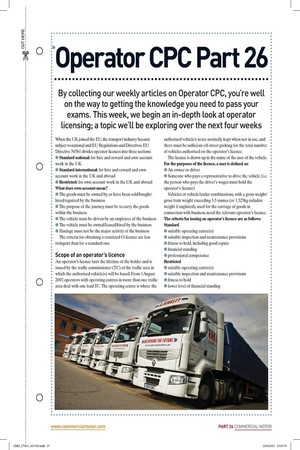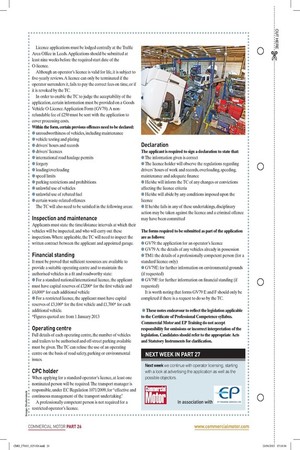'Operator CPC Part 26 By collecting our weekly articles on
Page 18

Page 19

If you've noticed an error in this article please click here to report it so we can fix it.
Operator CPC, you're well on the way to getting the knowledge you need to pass your exams. This week, we begin an in-depth look at operator licensing; a topic well be exploring over the next four weeks When the UK joined the EU, the transport industry became subject to national and EU Regulations and Directives. EU Directive 74/561 divides operator licences into three sections: • Standard national: for hire and reward and own-account work in the UK • Standard international: for hire and reward and ownaccount work in the UK and abroad • Restricted: for own-account work in the UK and abroad What does own-account mean?
• The goods must be owned by, or have been sold/bought/ hired/repaired by the business • The purpose of the journey must be to carry the goods within the business • The vehicle must be driven by an employee of the business • The vehicle must be owned/leased/hired by the business • Haulage must not be the major activity of the business The criteria for obtaining a restricted 0-licence are less stringent than for a standard one.
Scope of an operator's licence An operator's licence lasts the lifetime of the holder and is issued by the traffic commissioner (TC) of the traffic area in which the authorised vehicle(s) will be based. From 1August 2007, operators with operating centres in more than one traffic area deal with one lead TC. The operating centre is where the authorised vehicle/s is/are normally kept when not in use, and there must be sufficient off-street parking for the total number of vehicles authorised on the operator's licence.
The licence is drawn up in the name of the user of the vehicle. For the purposes of the licence, a user is defined as: • An owner or driver • Someone who pays a representative to drive the vehicle (i.e. the person who pays the driver's wages must hold the operator's licence) Vehicles or vehicle/trailer combinations, with a gross weight/ gross train weight exceeding 3.5 tonnes (or 1,525kg unladen weight if unplated), used for the carriage of goods in connection with business, need the relevant operator's licence. The criteria for issuing an operator's licence are as follows: Standard • suitable operating centre(s) • suitable inspection and maintenance provisions • fitness to hold, including good repute • financial standing • professional competence Restricted • suitable operating centre(s) • suitable inspection and maintenance provisions • fitness to hold • lower level of financial standing Licence applications must be lodged centrally at the Traffic Area Office in Leeds. Applications should be submitted at least nine weeks before the required start date of the 0-licence.
Although an operator's licence is valid for life, it is subject to five-yearly reviews. A licence can only be terminated if the operator surrenders it, fails to pay the correct fees on time, or if it is revoked by the TC.
In order to enable the TC to judge the acceptability of the application, certain information must be provided on a Goods Vehicle 0-Licence Application Form (GV79). A nonrefundable fee of £250 must be sent with the application to cover processing costs.
Within the form, certain previous offences need to be declared: • unroadworthiness of vehicles, including maintenance • vehicle testing and plating • drivers' hours and records • drivers' licences • international road haulage permits • forgery • loading/overloading • speed limits • parking restrictions and prohibitions • unlawful use of vehicles • unlawful use of rebated fuel • certain waste-related offences The TC will also need to be satisfied in the following areas: Inspection and maintenance Applicants must state the time/distance intervals at which their vehicles will be inspected, and who will carry out these inspections. Where applicable, the TC will need to inspect the written contract between the applicant and appointed garage.
Financial standing It must be proved that sufficient resources are available to provide a suitable operating centre and to maintain the authorised vehicles in a fit and roadworthy state: • For a standard national/international licence, the applicant must have capital reserves of £7,200* for the first vehicle and £4,000* for each additional vehicle • For a restricted licence, the applicant must have capital reserves of £3,100* for the first vehicle and £1,700* for each additional vehicle.
*Figures quoted are from 1 January 2013 Operating centre Full details of each operating centre, the number of vehicles and trailers to be authorised and off-street parking available must be given. The TC can refuse the use of an operating centre on the basis of road safety, parking or environmental issues.
CPC holder When applying for a standard operator's licence, at least one nominated person will be required. The transport manager is responsible, under EC Regulation 1071/2009, for "effective and continuous management of the transport undertaking': A professionally competent person is not required for a restricted operator's licence. Declaration The applicant is required to sign a dedaration to state that: • The information given is correct • The licence holder will observe the regulations regarding drivers' hours of work and records, overloading, speeding, maintenance and adequate finance • He/she will inform the TC of any changes or convictions affecting the licence criteria • He/she will abide by any conditions imposed upon the licence • If he/she fails in any of these undertakings, disciplinary action may be taken against the licence and a criminal offence may have been committed The forms required to be submitted as part of the application are as follows: • GV79: the application for an operator's licence • GV79 A: the details of any vehicles already in possession • TM1: the details of a professionally competent person (for a standard licence only) • GV79E: for further information on environmental grounds (if requested) • GV79F: for further information on financial standing (if requested) It is worth noting that forms GV79 E and F should only be completed if there is a request to do so by the TC.
• These notes endeavour to reflect the legislation applicable to the Certificate of Professional Competence syllabus. Commercial Motor and EP Training do not accept responsibility for omissions or incorrect interpretation of the legislation. Candidates should refer to the appropriate Acts and Statutory Instruments for clarification.








































